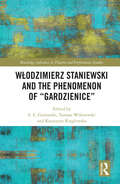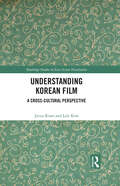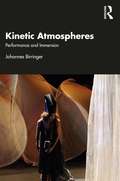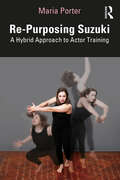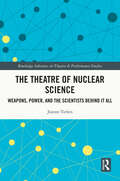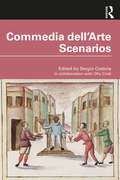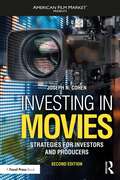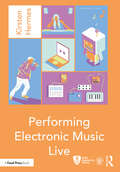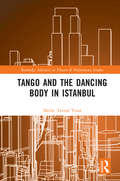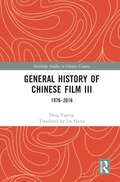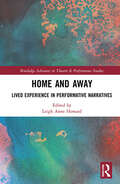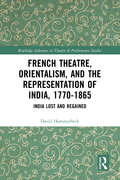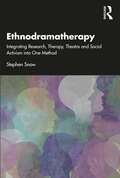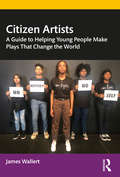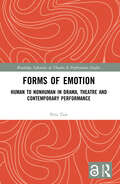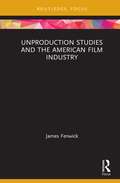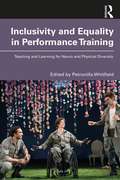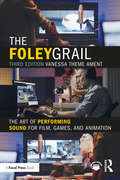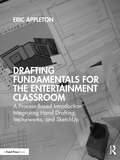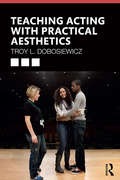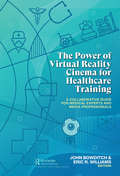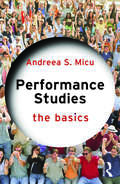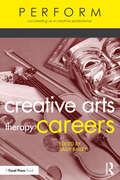- Table View
- List View
Włodzimierz Staniewski and the Phenomenon of “Gardzienice” (Routledge Advances in Theatre & Performance Studies)
by Tomasz Wiśniewski S. E. Gontarski Katarzyna KręglewskaThis book offers a broad overview of the contemporary state of the Gardzienice theatrical company and its evolution. Their most recent production, The Wedding, is taken as a focal point for a retrospective discussion on the company’s development. Premiered at the festival celebrating the 40th anniversary of the company, The Wedding echoes most of the major achievements of Staniewski’s stage language and his capacity of exploring and developing the performative potential of liveness. This study consists of essays by prominent practitioners and theoreticians of theatre, director’s notes, conversations with Staniewski and other company members, selected archival materials and substantial visual coverage. It promises to be of great interest to students and scholars across the fields of theatre and performance studies.
Understanding Korean Film: A Cross-Cultural Perspective
by Jieun Kiaer Loli KimFilm viewing presents a unique situation in which the film viewer is unwittingly placed in the role of a multimodal translator, finding themselves entirely responsible for interpreting multifaceted meanings at the mercy of their own semiotic repertoire. Yet, researchers have made little attempt, as they have for literary texts, to explain the gap in translation when it comes to multimodality. It is no wonder then that, in an era of informed consumerism, film viewers have been trying to develop their own toolboxes for the tasks that they are faced with when viewing foreign language films by sharing information online. This is particularly the case with South Korean film, which has drawn the interest of foreign viewers who want to understand these untranslatable meanings and even go as far as learning the Korean language to do so. Understanding Korean Film: A Cross-Cultural Perspective breaks this long-awaited ground by explaining the meaning potential of a selection of common Korean verbal and non-verbal expressions in a range of contexts in South Korean film that are often untranslatable for English-speaking Western viewers. Through the selection of expressions provided in the text, readers become familiar with a system that can be extended more generally to understanding expressions in South Korean films. Formal analyses are presented in the form of in-depth discursive deconstructions of verbal and non-verbal expressions within the context of South Korea’s Confucian traditions. Our case studies thus illustrate, in a more systematic way, how various meaning potentials can be inferred in particular narrative contexts.
Understanding Korean Film: A Cross-Cultural Perspective (Routledge Studies in East Asian Translation)
by Jieun Kiaer Loli KimFilm viewing presents a unique situation in which the film viewer is unwittingly placed in the role of a multimodal translator, finding themselves entirely responsible for interpreting multifaceted meanings at the mercy of their own semiotic repertoire. Yet, researchers have made little attempt, as they have for literary texts, to explain the gap in translation when it comes to multimodality. It is no wonder then that, in an era of informed consumerism, film viewers have been trying to develop their own toolboxes for the tasks that they are faced with when viewing foreign language films by sharing information online. This is particularly the case with South Korean film, which has drawn the interest of foreign viewers who want to understand these untranslatable meanings and even go as far as learning the Korean language to do so. Understanding Korean Film: A Cross-Cultural Perspective breaks this long-awaited ground by explaining the meaning potential of a selection of common Korean verbal and non-verbal expressions in a range of contexts in South Korean film that are often untranslatable for English-speaking Western viewers. Through the selection of expressions provided in the text, readers become familiar with a system that can be extended more generally to understanding expressions in South Korean films. Formal analyses are presented in the form of in-depth discursive deconstructions of verbal and non-verbal expressions within the context of South Korea’s Confucian traditions. Our case studies thus illustrate, in a more systematic way, how various meaning potentials can be inferred in particular narrative contexts.
Kinetic Atmospheres: Performance and Immersion
by Johannes BirringerThis book offers a sustained and deeply experiential pragmatic study of performance environments, here defined at unstable, emerging, and multisensational atmospheres, open to interactions and travels in augmented virtualities. Birringer’s writings challenge common assumptions about embodiment and the digital, exploring and refining artistic research into physical movement behavior, gesture, sensing perception, cognition, and trans-sensory hallucination. If landscapes are autobiographical, and atmospheres prompt us to enter blurred lines of a "forest knowledge," where light, shade, and darkness entangle us in foraging mediations of contaminated diversity, then such sensitization to elemental environments requires a focus on processual interaction. Provocative chapters probe various types of performance scenarios and immersive architectures of the real and the virtual. They break new ground in analyzing an extended choreographic – the building of hypersensorial scenographies that include a range of materialities as well as bodily and metabodily presences. Foregrounding his notion of kinetic atmospheres, the author intimates a technosomatic theory of dance, performance, and ritual processes, while engaging in a vivid cross-cultural dialogue with some of the leading digital and theatrical artists worldwide. This poetic meditation will be of great interest to students and scholars in theatre, performing arts as well as media arts practitioners, composers, programmers, and designers.
Re-Purposing Suzuki: A Hybrid Approach to Actor Training
by Maria PorterRe-Purposing Suzuki: A Hybrid Approach to Actor Training introduces a system of text analysis that synthesizes physical, psychological, and vocal components in order to truthfully embody heightened texts and contexts. By understanding how the author has re-purposed Suzuki and other physical training methods, as well as Stanislavski, readers will gain an awareness of how to analyze a particular training method by extrapolating its key components and integrating it into a holistic, embodied approach to text analysis. The book explores a method of physical scoring via Rules of the Body and Rules of Composition, as well as a method of approaching heightened texts from Greek drama to post-modern playwrights that draws on the individual actor’s imagination and experience and integrates voice, mind, and body. Readers will be able to either replicate this approach, or apply the logic of its building blocks to assemble their own personal creative process applicable to a variety of performance genres. This is a source book for actors, theatre students, practitioners, and educators interested in assembling tools derived from different sources to create alternative approaches to actor training. While the process outlined in the book evolves in a classroom setting, the components of the pedagogy can also be practiced by individuals who are interested in finding new ways to explore text and character and bring them into their own personal practice.
The Theatre of Nuclear Science: Weapons, Power, and the Scientists Behind it All (Routledge Advances in Theatre & Performance Studies)
by Jeanne P TiehenThe Theatre of Nuclear Science theoretically explores theatrical representations of nuclear science to reconsider a science that can have consequences beyond imagination. Focusing on a series of nuclear science plays that span the twentieth and twenty-first centuries, and including performances of nuclear science in museums, film, and media, Jeanne Tiehen argues why theatre and its unique qualities can offer important perspectives on this imperative topic. This book will be of great interest to students and scholars of theatre, politics, and literature.
The Theatre of Luis Valdez (4x45)
by Michael M. ChemersThe Theatre of Luis Valdez focuses on the life and work of American playwright and director Luis Valdez, probably best known for his landmark 1979 play Zoot Suit – the first play by a Latinx playwright to appear on Broadway – and founder of El Teatro Campesino, the oldest surviving community theatre in the United States. Built around first-hand discussions of Valdez’s work, this collection gives an in-depth understanding of where ‘the godfather of Chicano theatre’ fits in the grand scheme of American drama and performance. Collaborators Edward James Olmos and Alma Martinez talk about working with Valdez and El Teatro Campesino; scholar Leticia Garcia interviews Jorge Huerta, the leading authority on Chicanx and Latinx theatre on the impact of Valdez work; and Luis Valdez himself contributes a lecture on all aspects of his craft from political resistance and the migrant experience to actor training and dramatic form. A concise and accessible study, 4x45 || Luis Valdez is the go-to resource for scholars, students and theatre practitioners looking for an introduction to this seminal figure in modern American performance.
Commedia dell'Arte Scenarios
by Olly Crick Sergio CostolaCommedia dell'Arte Scenarios gathers together a collection of scenarios from some of the most important Commedia dell'Arte manuscripts, many of which have never been published in English before. Each script is accompanied by an editorial commentary that sets out its historical context and the backstory of its composition and dramaturgical strategies, as well as scene summaries, and character and properties lists. These supplementary materials not only create a comprehensive picture of each script’s performance methods but also offer a blueprint for readers looking to perform the scenarios as part of their own study or professional practice. This collection offers scholars, performers and students a wealth of original performance texts that brig to life one of the most foundational performance genres in world theatre.
Investing in Movies: Strategies for Investors and Producers (American Film Market Presents)
by Joseph N. CohenIn this second edition of Investing in Movies, industry veteran Joseph N. Cohen provides investors and producers with an analytical framework to assess the opportunities and pitfalls of film investments. The book traces macroeconomic trends and the globalization of the business, including the rise of streamers, as well as the impact these have on potential returns. It offers a broad range of guidelines on how to source interesting projects and advice on what kinds of projects to avoid, as well as numerous ways to maximize risk-adjusted returns. While focusing primarily on investments in independent films, Cohen also provides valuable insights into the studio and independent slate deals that have been marketed to the institutional investment community. As well, this new edition has been updated to fully optimize the current film industry climate including brand new chapters on the Chinese film market, new media/streaming services, and the effects of COVID-19 on the global film market. Written in a detailed and approachable manner, this book is essential for students and aspiring professionals looking to gain an insider perspective against the minefield of film investing.
Performing Electronic Music Live (Audio Engineering Society Presents)
by Kirsten HermesPerforming Electronic Music Live lays out conceptual approaches, tools, and techniques for electronic music performance, from DJing, DAWs, MIDI controllers, traditional instruments, live sound design, hardware setups, custom software and hardware, to live visuals, venue acoustics, and live show promotion. Through case studies and contrasting tutorials by successful artists, Kirsten Hermes explores the many different ways in which you can create memorable experiences on stage. Featuring interviews with highly accomplished musicians and practitioners, readers can also expand on their knowledge with hands-on video tutorials for each chapter via the companion website, performingelectronicmusic.live. Performing Electronic Music Live is an essential, all-encompassing resource for professionals, students of music production courses, and researchers in the field of creative-focused performance technology.
Tango and the Dancing Body in Istanbul (Routledge Advances in Theatre & Performance Studies)
by Melin Levent YunaTango and the Dancing Body in Istanbul explores the expansion of social Argentine tango dancing among Muslim actors in Turkey, pioneered in Istanbul despite the conservative rule of the Justice and Development Party (JDP) and Tayyip Erdoğan. In this book, Melin Levent Yuna questions why a dance that appears to publicly represent an erotic relationship finds space to expand and increase dramatically in the number of contemporary Turkish Muslim tango dancers, particularly during a conservative rule. Even during the 2020 Covid-19 pandemic, tango dance classes, gatherings, and messages flourished on YouTube, Facebook, Instagram, and Zoom. Urban Turkey and its tango dance performances provide one symbol and example of how neoliberal capitalism could go hand in hand with conservatism by becoming a bridge between Europe and the Middle East. This study largely focuses on the dancers’ perspective while presenting the policies of Erdoğan. It presents the social characteristics of the tango dancers, the meanings they attach to their bodies and their dance as well as what this dance reflects about them – besides the policies of the Justice and Development Party. The book approaches the tango dance and its dancing body in terms of layers of meaning systems in a neoliberal and conservative context. This study will be of great interest to students and scholars in dance, anthropology, cultural studies, and performance studies.
General History of Chinese Film III: 1976–2016 (Routledge Studies in Chinese Cinema)
by Ding YapingThe Reform and Opening-up of China since the late 1970s has not only transformed the economic and political situation of the country, but also transformed the Chinese film industry. This volume focuses on the 40 years of the history of Chinese film in the post-Mao era. As all aspects of film production, distribution and exhibition have been commercialized, Chinese film has become an industry of immense scale and has grown by leaps and bounds. Meanwhile, contemporary Chinese film is marked by a new zeitgeist, with Chinese film closely integrated with Chinese society and the economy. The author argues that the Chinese film industry clearly stands at a turning point where the future of Chinese film and the way to further awaken, change, and shape film production have become important issues worth consideration in contemporary film history. The book will be essential reading for scholars and students in film studies, Chinese studies, cultural studies and media studies, helping readers develop a comprehensive understanding of Chinese film.
Home and Away: Lived Experience in Performative Narratives (Routledge Advances in Theatre & Performance Studies)
by Leigh Anne HowardHome and Away explores how performative writing serve as a process that critically interrogates space/place in relation to personal, social, cultural, and political understanding. By combining aesthetic expression and inquiry with critical reflection, the contributors in this volume use a variety of narrative strategies—autoethnography, mystoriography, creative cartography, the lyric essay, fictocriticism, collage, the screenplay, and poetics—to position place as the starting point for the aesthetic impulse. The anthology showcases the power and potential of performative writing to illustrate the ways we interact with and in place; provides examples of the ways one can express lived experience; and demonstrates the ways discourses overlap while extending our understanding of identity and place, whether one is home or away. Although the chapters are fixed by their literary form in this volume, many of chapters are best realized in a performance or shared publicly via an oral tradition. This collection will be of great interest to students and scholars in performance, communication studies, and literature.
French Theatre, Orientalism, and the Representation of India, 1770-1865: India Lost and Regained (Routledge Advances in Theatre & Performance Studies)
by David HammerbeckThis book examines the French theatricalization of India from 1770 to 1865 and how a range of plays not only represented India to the French viewing public but also staged issues within French culture including colonialism, imperialism, race, gender, and national politics. Through examining these texts and available performance history, and incorporating historical texts and cultural theory, David Hammerback analyses these works to illustrate a complex of cultural representations: some contested Orientalism, some participated in Western colonialist discourses, while some can be placed somewhere between these two markers of ideology in Western culture and the arts. He also assesses the works which participated in shaping the theatrical face of Western hegemony, ones directly participating in Orientalism as delineated by Edward Said and others. This book will be of great interest to students and scholars in theatre, French literature, history and cultural studies.
Ethnodramatherapy: Integrating Research, Therapy, Theatre and Social Activism into One Method
by Stephen SnowEthnodramatherapy explores the integration of the performance ethnography method, known as ethnodrama, with the principles and practices of drama therapy to establish a sound theoretical formulation for ethnodramatherapy, and considers its use as art, as therapy, as research and as a vehicle for social justice. The book begins by defining ethnodramatherapy – an original synthesis created by the author through deep study and practice of Mienczakowski’s enthnodrama, combined with 35 years of his own practice and research in drama therapy, creative arts therapies and therapeutic theatre. The book describes the origins of ethnodramatherapy, along with its evolution and method. It then delves into applications of the practice highlighted by five case studies with different audiences in different settings. Subjects include adults with developmental disabilities, female adolescents in youth protection, caregivers for loved ones with mental illnesses and Chinese students exploring controversial issues of oppression in China. Complex ethical issues are reviewed and suggestions are made on how to deal with some of the challenging ethical situations that are likely to arise in the ethnodramatherapy process. What emerges is a powerful tool that harnesses theatrical art, ethnographic research and the clinical techniques of drama therapy to create a potential for emancipatory experience for both performers and audiences. This exciting and dynamic synthesis of drama therapy, performance ethnography, theatrical art and social activism will be of interest to the whole community of theatre practitioners and scholars who use theatre to effect individual and social change, including the disciplines of applied theatre, theatre education, experimental theatre, performance studies, and, of course, drama therapy, psychodrama and the other creative arts therapies.
Citizen Artists: A Guide to Helping Young People Make Plays That Change the World
by James WallertCitizen Artists takes the reader on a journey through the process of producing, funding, researching, creating, rehearsing, directing, performing, and touring student-driven plays about social justice. The process at the heart of this book was developed from 2015–2021 at New York City’s award-winning Epic Theatre Ensemble with and for their youth ensemble: Epic NEXT. Author and Epic Co-Founder James Wallert shares his company’s unique, internationally recognized methodology for training young arts leaders in playwriting, inquiry-based research, verbatim theatre, devising, applied theatre, and performance. Readers will find four original plays, seven complete timed-to-the-minute lesson plans, 36 theatre arts exercises, and pages of practical advice from more than two dozen professional teaching artists to use for their own theatre making, arts instruction, or youth organizing. Citizen Artists is a one-of-a-kind resource for students interested in learning about theatre and social justice; educators interested in fostering learning environments that are more rigorous, democratic, and culturally-responsive; and artists interested in creating work for new audiences that is more inclusive, courageous, and anti-racist.
Forms of Emotion: Human to Nonhuman in Drama, Theatre and Contemporary Performance (Routledge Advances in Theatre & Performance Studies)
by Peta TaitForms of Emotion analyses how drama, theatre and contemporary performance present emotion and its human and nonhuman diversity. This book explores the emotions, emotional feelings, mood, and affect, which make up a spectrum of ‘emotion’, to illuminate theatrical knowledge and practice and reflect the distinctions and debates in philosophy, neuroscience, psychology, and other disciplines. This study asserts that specific forms of emotion are intentionally unified in drama, theatre, and performance to convey meaning, counteract separation and subversively champion emotional freedom. The book progressively shows that the dramatic and theatrical representation of the nonhuman reveals how human dominance is offset by emotional connection with birds, animals, and the natural environment. This book will be of great interest to students and researchers interested in the emotions and affect in dramatic literature, theatre studies, performance studies, psychology, and philosophy as well as artists working with emotionally expressive performance.
Unproduction Studies and the American Film Industry (Routledge Focus on Film Studies)
by James FenwickThis book makes the case for unproduction studies, the study of films left unmade, unseen, or unreleased, as a radical discipline with the potential to uncover a shadow history of the American film industry. Exploring the archival methods that can be utilised in this endeavour, James Fenwick argues that a revisionist history is needed to understand the logic of the film industry, finding that it has long-been predicated on a system of unmade creativity in which finances, resources, and labour is invested into projects that production companies know will never be produced or have no intention of ever producing. Using the Production Code Administration (PCA) records, housed at the Margaret Herrick Library, as a case study, the book explores the material existence of the unmade and considers how archives and archival methods can be used to construct a shadow history that recovers the forgotten, marginalised, and overlooked figures in film history, providing explanations for structural forces that contributed to the unmade. Given its unique use of the unmade as an analytic for film history, this book will be an essential read for scholars interested in film and media history, performance studies, film production, and creative practice, as well as to archivists and archival researchers.
Inclusivity and Equality in Performance Training: Teaching and Learning for Neuro and Physical Diversity
by Petronilla WhitfieldInclusivity and Equality in Performance Training focuses on neuro and physical difference and dis/ability in the teaching of performance and associated studies. It offers 19 practitioners’ research-based teaching strategies, aimed to enhance equality of opportunity and individual abilities in performance education. Challenging ableist models of teaching, the 16 chapters address the barriers that can undermine those with dis/ability or difference, highlighting how equality of opportunity can increase innovation and enrich the creative work. Key features include: Descriptions of teaching interventions, research, and exploratory practice to identify and support the needs and abilities of the individual with dis/ability or difference Experiences of practitioners working with professional actors with dis/ability or difference, with a dissemination of methods to enable the actors A critical analysis of pedagogy in performance training environments; how neuro and physical diversity are positioned within the cultural contexts and practices Equitable teaching and learning practices for individuals in a variety of areas, such as: dyslexia, dyspraxia, visual or hearing impairment, learning and physical dis/abilities, wheelchair users, aphantasia, attention-deficit/hyperactivity disorder and autistic spectrum. The chapter contents originate from practitioners in the UK, USA and Australia working in actor training conservatoires, drama university courses, youth training groups and professional performance, encompassing a range of specialist fields, such as voice, movement, acting, Shakespeare, digital technology, contemporary live art and creative writing. Inclusivity and Equality in Performance Training is a vital resource for teachers, directors, performers, researchers and students who have an interest in investigatory practice towards developing emancipatory pedagogies within performance education.
The Foley Grail: The Art of Performing Sound for Film, Games, and Animation
by Vanessa Theme AmentThis book teaches you how to master classic and cutting edge Foley techniques in order to create rich and convincing sound for any medium, be it film, television, radio, podcasts, animation, or games. Award-winning Foley artist Vanessa Theme Ament demonstrates how Foley is designed, crafted, and edited for any project, down to the nuts and bolts of spotting, cueing, and performing sounds. Various renowned sound artists provide a treasure trove of indispensable shortcuts, hot tips, and other valuable tricks of the trade. This updated third edition features the following: New chapters dedicated to Foley in games, television, broadcasting, and animation, as well as what is new in sound for media education A multitude of sound "recipes" that include proven Foley methods you can immediately use on your own projects A diverse range of case studies from well-known films, shows, games, and animation Interviews with current sound artists from around the world By exploring the entire audio post-production process, this book provides you with an excellent understanding of where Foley fits in the business of filmmaking and is a perfect guide for both newcomers and experienced sound designers wanting to learn more about this art. Accompanying the book are online resources featuring video demonstrations of Foley artists at work, video tutorials of specific Foley techniques, lectures from the author and more.
Drafting Fundamentals for the Entertainment Classroom: A Process-Based Introduction Integrating Hand Drafting, Vectorworks, and SketchUp
by Eric AppletonDrafting Fundamentals for the Entertainment Classroom: A Process-Based Introduction to Hand Drafting, Vectorworks, and SketchUp guides students through a syllabus-formatted semester of integrated drafting concepts and skills. This book links beginner visualization practices with fundamental software knowledge through step-by-step exercises and examples. By presenting hand drafting and Vectorworks through incremental exercises, students not only gain an understanding of the tools used in drafting but also learn why the tools, practices, and standards exist in the first place. SketchUp, a user-friendly 3D modeling program, is integrated into the various exercises to help readers visualize concepts and begin modeling their own ideas. By the end of the book, students will understand drawing construction techniques, United States Institute for Theatre Technology (USITT)-recommended graphic standards, and the typical drawings created for entertainment design, preparing them to dive more deeply into the further complexities and opportunities of Vectorworks and SketchUp. Drafting Fundamentals for the Entertainment Classroom is written to complement a 14- or 15-week semester of an Entertainment Drafting course. The book’s format also provides structure for independent and self-directed study.
Teaching Acting with Practical Aesthetics
by Troy DobosiewiczTeaching Acting with Practical Aesthetics uses constructivist pedagogy to teach acting via Practical Aesthetics, a system of actor training created in the mid-1980s by David Mamet. The book melds the history of Practical Aesthetics, Practical Aesthetics itself, educational theory, and compatible physical work into the educational approach called Praxis to create a comprehensive training guide for the modern actor and theatre instructor. It includes lesson plans, compatible voice and movement exercises, constructivist teaching materials, classroom handouts, and a suggested calendar for Acting courses. Written for Acting instructors at the college and secondary levels, Acting scholars, and professionals looking for a new way to perform, Teaching Acting with Practical Aesthetics offers detailed instructions to help students sharpen their performing skills and excel on stage.
The Power of Virtual Reality Cinema for Healthcare Training: A Collaborative Guide for Medical Experts and Media Professionals
by Bob Fine Eric R. Williams John Bowditch Adonis DuradoCinematic Virtual Reality brings a combination of documentary, narrative and game design principles to the medical profession and, in the healthcare arena, collaboration is a key component for creating intellectually- and emotionally- rich immersive experiences. "The Power of Virtual Reality Cinema for Healthcare Training" gathers more than a dozen experts from both the production and healthcare fields to break down best practices for creating successful cine-VR projects. Designed for multi-disciplinary teams interested in integrating cine-VR production into their healthcare training and educational programs, this book has been written for two audiences: the healthcare professional interested in what production experts consider when approaching a project, and the media expert curious about how this new technology can be used in the medical field. Highlights include: Cutting edge medical education techniques developed by Ohio University’s GRID Lab, including: PREality (creating a forced sense of deja-vu to increase acclimation time), a unique approach to eye-tracking to enhance team performance, and the low-CRIS technique (a low-cost rapid implementation strategy to capture patient care for rapid graduate student training). Insightful production techniques that will enhance your cine-VR projects including advanced plating methods to hide lighting set-ups, immersive audio considerations, and new ways to consider 360 storytelling including the Lovrick montage and the Christmas Carol continuum for story development. Detailed explanations of the production considerations and results of specific cine-VR productions (from funding approaches to distribution) including access to more than five hours of cine-VR examples of the actual productions available for download. Details on a wide variety of medical cine-VR projects, including 100 images that illustrate best practices for topics such as recording in active medical facilities, building successful multi-disciplinary teams, working within HIPAA regulations, conceptualizing cine-VR libraries for graduate education, and implementing innovative distribution models.
Performance Studies: The Basics (The Basics)
by Andreea S. MicuPerformance Studies: The Basics offers an overview of the multiple, often overlapping definitions of performance, from performance art, performance as everyday life, and rituals, to the performative dimensions of identity, such as gender, race and sexuality. This book defines the interdisciplinary field of performance studies as it has evolved over the past four decades at the intersection of academic scholarship and artistic and activist practices. It discusses performance as an important means of communicating and of understanding the world, highlighting its intersections with critical theory and arguing for the importance of performance in the study of human behaviour and social practices. Complete with a helpful glossary and bibliography, as well as suggestions for further reading, this book is an ideal starting point for those studying performance studies as well as for general readers with an interest in the subject.
Creative Arts Therapy Careers: Succeeding as a Creative Professional (PERFORM)
by Sally BaileyCreative Arts Therapy Careers is a collection of essays written by and interviews with registered drama therapists, dance/movement therapists, music therapists, art therapists, poetry therapists, and expressive arts therapists. The book sheds light on the fascinating yet little-known field of the creative arts therapies – psychotherapy approaches which allow clients to use creativity and artistic expression to explore their lives, solve their problems, make meaning, and heal from their traumas. Featuring stories of educators in each of the six fields and at different stages of their career, it outlines the steps one needs to take in order to find training in one of the creative arts therapies and explores the healing aspects of the arts, where creative arts therapists work, who they work with, and how they use the arts in therapy. Contributors to this book provide a wealth of practical information, including ways to find opportunities to work with at-risk populations in order to gain experience with the arts as healing tools; choosing the right graduate school for further study; the difference between registration, certification, and licensure; and the differences between a career in a medical, mental health, educational, correctional, or service institution. This book illuminates creative arts therapy career possibilities for undergraduate and graduate students studying acting, directing, playwriting, creative writing, visual arts, theatre design, dance, and music. It is also an excellent resource for instructors offering a course to prepare arts students of all kinds for the professional world.
